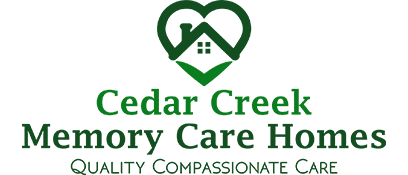Almost everyone is familiar with the adage, “If you don’t use it, you’ll lose it.” This is true regarding the brain. Not exercising the brain may cause older adults to slow down mentally and physically. Discover what are good memory games for seniors and how they can help boost cognitive function.
According to experts, memory skills may decrease as individuals get older for many reasons. Parts of the brain can shrink, communication between nerve cells diminishes and the blood flow in the brain can decrease. However, the good news for older adults is that exercising the brain can help improve memory and other cognitive functions. Memory games for seniors are like brain exercises and, in some cases, may boost cognitive skills.
At Cedar Creek Memory Care Homes in Maryland, we understand the concern over memory loss during senior years. We also know how vital it is for seniors to continue to exercise their brains even when they begin to experience cognitive decline.
Brain Training Games for Seniors
Engaging in brain training games is an excellent way to exercise the brain. Brain games are accessible and plentiful, from traditional board games to smartphone and computer apps. Seniors can use games to challenge their brains and improve cognitive skills, including logical reasoning and problem-solving.
Brain games are plentiful and free or inexpensive. The best memory games for seniors include:
- Classic board games
- Memory games
- Puzzle games
- Jigsaw puzzles
- Trivia challenges
Classic Board Games
People of all ages enjoy playing chess and other board games. Chess exercises memory because players need to remember the rules, recall previous moves and plan future strategies. As a result, the prefrontal cortex, the area of the brain responsible for critical thinking, gets a workout. Scrabble is a classic board game that requires hand-eye coordination and spatial awareness to arrange tiles while creating words. This may strengthen a player’s cognitive ability.

Memory Games
Memory games, such as the card game Concentration, can help older adults with recall skills. Players select two cards at a time to get two cards with the same number and color, such as a four of diamonds and a four of hearts. If the player does not choose a pair of matching cards, they return the two cards to the table. As play continues, if players concentrate and remember where they saw earlier cards, they’re likely to find matches.
Serial recall is another example of a memory activity that can help maintain cognitive skills. Given a series of items like digits, alphabets or pictures, individuals look at them and try to recall the original order. Learning a telephone number is an example of serial recall.
Seniors who use smartphones and computers can find free memory games to download. It’s important to be careful when accessing free games and avoid signing up for paid subscriptions to games or giving out personal information.
Puzzle Games
Puzzle games for seniors include crossword puzzles, Sudoku and word searches that help strengthen cognitive skills.
Solving crossword puzzles may improve cognitive abilities and decrease brain shrinkage in older adults.
Sudoku puzzles consist of a grid with nine columns down and nine rows across, divided into sub-grids of three rows across and three columns down. Sudoku players must fill the grids with numbers 1-9 without repeating any number in any row, column or sub-grid. The process of thinking ahead and problem-solving that individuals experience by solving Sudoku puzzles helps keep the brain active.
Like Sudoku, word searches can help exercise the brain because completing them requires thinking and problem-solving.
Jigsaw Puzzles
Putting together a jigsaw puzzle is a relaxing activity that distracts the mind from the day’s burdens. Working on a jigsaw puzzle is a short-term memory exercise that requires concentration. Jigsaw puzzles work on both sides of the brain — both the logic-controlling left side of the brain and the creative right side of the brain are active when manipulating jigsaw puzzle pieces. New brain connections can also form when working on jigsaw puzzles, boosting brain health and improving memory skills and hand-eye coordination.

Trivia Challenges
Trivia games for seniors can be fun and healthy for the brain. Trivia games may focus on music, popular television shows, movies or just about any topic. A trivia game can be as simple as guessing a word after being given a definition or another prompt.
Playing trivia games with a group usually brings lots of laughs, which is good for health. Trivia books and online trivia free apps are good sources for games. Playing along with trivia game shows on television provides opportunities to test recall skills, and usually, there’s a requirement to beat the clock. Trivia engages the frontal cortex and can help improve memory and problem-solving skills.
What are Good Memory Games for Seniors that Helps Enhance Cognitive Function?
Seniors and their families seeking brain training games should always consider what’s fun. A confusing or difficult game will leave a player feeling agitated, bored or frustrated. Word games and other brain health games appeal to people because they promote socialization.
Playing games with a partner or group can spark hours of conversation and generate hearty laughter. Being with people promotes mental health and keeps individuals from becoming isolated. Whether older adults play matching games, trivia games using a computer app or pencil and paper word games, each activity offers positive benefits.
At Cedar Creek Memory Care Homes in Maryland, seniors and their families will find high-quality dementia care in an intimate boutique setting. Seniors at Cedar Creek have opportunities to participate in many memory care activities, including memory games, to help with cognitive skills. Families count on our memory care facilities in Maryland for compassionate and engaging dementia care.
If you have a loved one with memory issues, give Cedar Creek Memory Care Homes a call and learn how your loved one can benefit from a safe and nurturing setting that treats each resident as an individual. Contact us today at (301) 384-4017 to arrange a visit.





